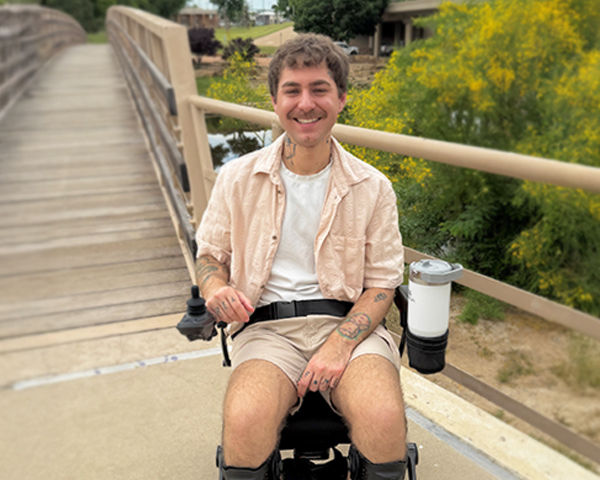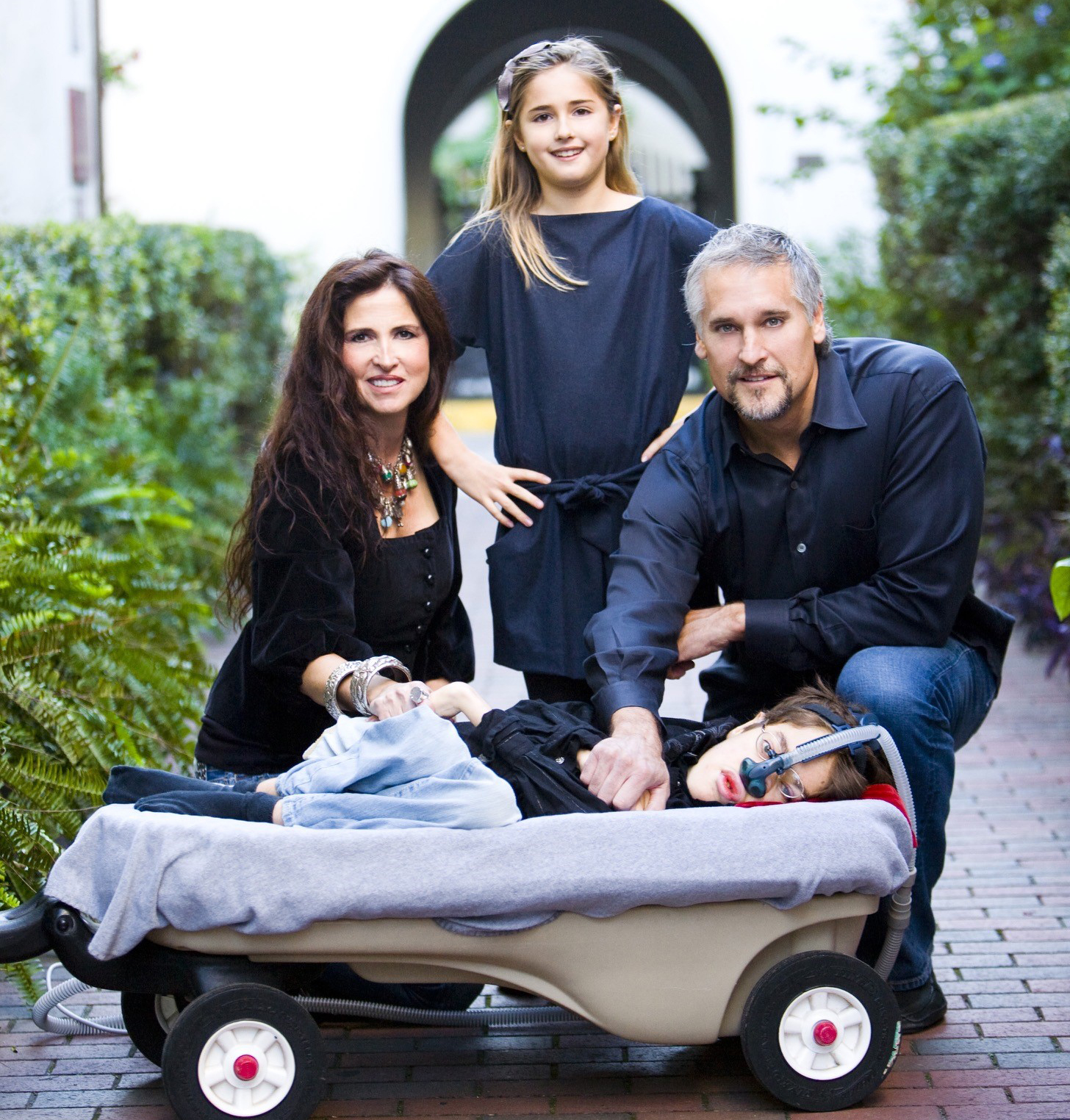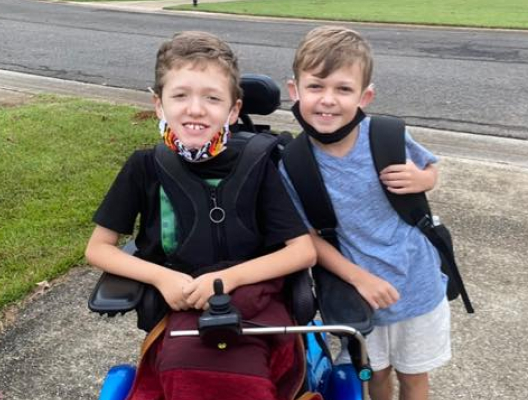

STRENGTHENING the global effort to CURE neuromuscular disease
News Express
Racing Laps for a Cure: Brad’s Becker Muscular Dystrophy Story
Brad Miller of Ontario, Canada, began experiencing frequent falls and difficulties running as a young boy. “Early on, I had a hard time keeping up with the other kids my age,” Brad explains. “When the other children started climbing trees and fences, it simply wasn’t possible for me.” With his parents noticed Brad’s developmental difficulties, the Millers made an appointment with the family doctor. “I was around 10-years-old at that point,” Brad recalls, “I simply knew I couldn’t run and was suffering plenty of falls.”
Lucky for Brad, the physician the Millers saw was knowledgeable about muscular dystrophy (MD). Their visit led to Brad staying a few days at The Hospital for Sick Children (Sick Kids) in Toronto to undergo testing. “In that first round of testing, I had a muscle biopsy,” Brad says. “Eventually, the tests led to me being diagnosed with Becker muscular dystrophy (Becker MD) at the age of 10. I am truly thankful that my parents became concerned with the issues. This is what resulted in me not having to live very long without a diagnosis.” Brad remembers the day his family pulled up to what he thought looked like a house that fateful day. “It was really a doctor’s office,” Brad recalls. “I remember being told the words, but honestly not fully understanding what it would mean—especially not how it might impact my life. My focus at the time was my arm having stitches from the biopsy and returning to school to see all my friends.”
Becker MD is an inherited disorder of muscle structure that results in progressive weakness of limb and breathing muscles. Becker MD usually begins in the teens or early adulthood, and early symptoms are cramps after exercising, and later, problems walking quickly or running. Besides weakness, other noticeable symptoms are falling, feeling worn out, and changes in the skeletal system. Boys are affected almost exclusively, and every ethnic background is affected. In a group of 100,000 people, approximately 3 will be affected with Becker MD.
Since Brad was young when he received his diagnoses, he doesn’t feel it impacted his daily life much, but instead gave him an answer to the physical issues he was facing. “After I received the diagnoses and was released from the hospital, I just continued playing with my friends—accepting the fact that there were certain things I was unable to do or partake in.” He learned to explain that Becker MD was the answer for his falls and inability to run.
As a boy, Brad’s main focus was joining friends and “playing outside until the street lights came on.” He continued enjoying life as best as he could, starting to get used to being left out in certain areas of childhood. “The only frustration honestly came with not being able to play team sports,” Brad explains. “Pretty soon after my diagnosis, I needed to stop playing soccer on my neighborhood’s local team. I was pretty crushed about that. And the only other unfortunate result was the bullying I had to deal with as a child, which happened mainly at school, and definitely made things difficult at times.”
Overall, Brad feels “very lucky” to have been seen by several medical professionals knowledgeable about MD. Brad explains, “A true benefit for me as a child was the fact that I often visited a children’s rehabilitation center. So, up until the age of 18, I was followed very closely. I honestly can’t remember how many doctors followed me as a child, but there were many.” Today, Brad sees his family doctor, a cardiologist, a sleep specialist, and a doctor who specializes in MD. “All who do a wonderful job of making sure I am getting the best,” Brad adds. Brad would like to note to doctors and the public that patients with MD are not exaggerating and that the weakness or inability to do things doesn’t come from “not trying hard enough or being lazy,” though sometimes on the outside, they may not match the level of disease progression on the medical chart.
While Brad hasn’t sought out many types of treatments, he was offered steroids as an option. Along with his parents, the Millers decided it wasn’t necessary at the time. Over the years, Brad believes healthy eating, staying active, and sleeping well are his best forms of medicine. “For me, sleep is the best treatment for Becker MD because when I am not getting the proper amount, it puts me at risk of suffering falls, which can lead to injuries.”
To other families facing a diagnoses of MD, Brad has advice. “I would say take your time, don’t rush online to read all the possible negative outcomes it might bring. Start by seeking out personal stories to see how well we are doing and our ability to live life with a positive mindset.” Brad also suggests focusing on hobbies. “In my case,” Brad states, “music helps me escape and reduces stress. I also enjoy opportunities to laugh so I watch comedy movies to be filled with joy. But the truly best thing for me has been not having to go through this alone.”
Before suffering a work-related injury in 2008, Brad did not know anyone else living with MD. Eventually, he had to stop working. “All this free time led to me sharing my story, meeting others, and raising awareness of Becker MD and the issues we face,” Brad says. As a car enthusiast and lover of motorsports, Brad went on to found Laps for Muscular Dystrophy (LAPS4MD) where racers across North America raise awareness and funds benefiting MD charities by racing. “If I had never suffered the work-related injury, I would never have started the My Beckers Story blog or founded the efforts of LAPS4MD. I am truly thankful I was able to take what was a negative in my life and find a way to turn it into a positive. It’s always been about me doing my best to live within my limitations.” Brad cites knowing there are race drivers and teams raising funds and awareness for Becker MD as motivation to keep fighting through every day.
For Brad, the most difficult part of his journey has been slowly losing the ability to do things that many take for granted. “Years ago, just climbing stairs became nearly impossible for me, leading to a lot of frustration. Losing the ability to work has financially made it harder to acquire the important things I need as I age with Becker MD,” Brad states. “A good example of this is recently needing a mobility scooter and not being able to transport it in our current vehicle. In my case, I didn’t realize I’d need to start using one so soon. My mistake was not planning ahead, which has led to me and my wife facing the unexpected need of finding a way to afford a minivan. That is why my biggest piece of advice for everyone is to always plan ahead. If you already know one day your needs will change—especially when it comes to walking and needing a mobility scooter—get that minivan or accessible home in advance so when the time comes, you are already prepared.”
More information about Brad Miller, LAPS4MD, Becker MD and more can be found on his blog mybeckersstory.blogspot.com, which begins by stating, “Often men are told they have to be tough, to not complain and to refrain from showing any emotions. From the start I have decided to share my story openly and honestly as I truly have nothing to hide.”
To support future education and research of Becker muscular dystrophy and other neuromuscular and movement disorders, consider donating to the American Neuromuscular Foundation, where every dollar raised directly funds research.
Donate Today to Support Research and Researchers' Education
Every dollar raised is a dollar used to support researchers finding a cure. Administrative and staff assistance is provided by AANEM.
Apply for Research Grants & Awards
-
Development Grant Opportunities
-
Neuromuscular Research Grant Opportunities
-
Research and Educational Awards
Upcoming Events
-
ANF Neuromuscular Research Grants Application Deadline
-
ANF Development Grants Application Deadline
-
Resident Scholarship Applications Open
Thank You For Your Support
Together we are helping researchers find treatments and cures for tomorrow and improving the lives of patients with neuromuscular diseases.


